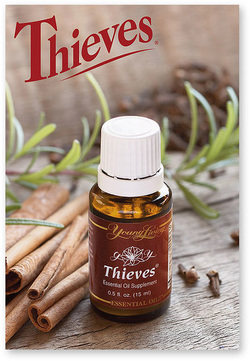
The Story of Thieves Oil
During the Black Plague of 16th century, a small band of thieves were caught in the act and brought before the King, who forced them to divulge a most curious secret. The thieves had been entering the homes of plague victims and stripping the dead bodies of money, jewelry and anything else of value that could be found. Although the plague was highly contagious, not one of this morbid band of thieves ever contracted the dread plague even though their thefts had put them in daily contact with the dead bodies of plague victims. The King, eager to protect himself and the Royal Family, demanded to know how the thieves had avoided contracting the plague.
Soon enough, the truth came out. The thieves were all members of the same family - a family from a long line of Apothecaries. Because of their intimate knowledge of the healing arts, passed down from generation to generation, they were familiar with a combination of specific plant oils that, when rubbed on the body, would protect the body from contracting this most feared and deadly disease. The King forced the thieves to divulge the specific plant oils used, and the formula for extracting them from the plants. With that vital information in hand, he was thereby able to protect himself and his family from the deadly plague.
The recipe for the thieves' oils can still be found in the Royal English Archives to this day. What's more, this story is not all that unusual. In fact, it is widely known that many perfumers and tanners in 16th century England were also able to escape the Black Plague due to the fact that the powerful, sweet smelling plant oils used in the making of various perfumes and in the scenting of leather goods exhibit phenomenal antiseptic properties.
History further reveals that virtually the entire town of Bucklersbury, England was spared from the plague, even while the residents of other towns in close proximity were dying in droves. How were the residents of Bucklersbury spared? Historians believe it was no fluke. This fortunate town was the center of the European lavender trade. Lavender is a plant the essential oil of which is widely used in making perfume. More importantly, the oil of lavender has long been known to have powerful disease fighting properties. In fact, recent scientific and medical research has proven that the essential oil of lavender has immune enhancing properties that rival and even surpass many modern antiseptic chemicals and antibiotic drugs.
During the Black Plague of 16th century, a small band of thieves were caught in the act and brought before the King, who forced them to divulge a most curious secret. The thieves had been entering the homes of plague victims and stripping the dead bodies of money, jewelry and anything else of value that could be found. Although the plague was highly contagious, not one of this morbid band of thieves ever contracted the dread plague even though their thefts had put them in daily contact with the dead bodies of plague victims. The King, eager to protect himself and the Royal Family, demanded to know how the thieves had avoided contracting the plague.
Soon enough, the truth came out. The thieves were all members of the same family - a family from a long line of Apothecaries. Because of their intimate knowledge of the healing arts, passed down from generation to generation, they were familiar with a combination of specific plant oils that, when rubbed on the body, would protect the body from contracting this most feared and deadly disease. The King forced the thieves to divulge the specific plant oils used, and the formula for extracting them from the plants. With that vital information in hand, he was thereby able to protect himself and his family from the deadly plague.
The recipe for the thieves' oils can still be found in the Royal English Archives to this day. What's more, this story is not all that unusual. In fact, it is widely known that many perfumers and tanners in 16th century England were also able to escape the Black Plague due to the fact that the powerful, sweet smelling plant oils used in the making of various perfumes and in the scenting of leather goods exhibit phenomenal antiseptic properties.
History further reveals that virtually the entire town of Bucklersbury, England was spared from the plague, even while the residents of other towns in close proximity were dying in droves. How were the residents of Bucklersbury spared? Historians believe it was no fluke. This fortunate town was the center of the European lavender trade. Lavender is a plant the essential oil of which is widely used in making perfume. More importantly, the oil of lavender has long been known to have powerful disease fighting properties. In fact, recent scientific and medical research has proven that the essential oil of lavender has immune enhancing properties that rival and even surpass many modern antiseptic chemicals and antibiotic drugs.
To Place An Oder: CLICK HERE
